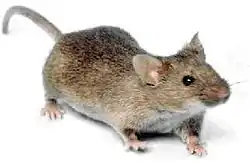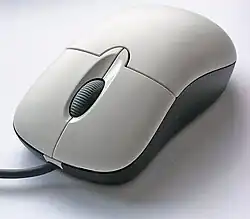mus
Translingual
Basque
Etymology
From earlier mux, probably from French mouche (“fly”).[1] However, compare musu (“kiss”).[2][3]
Pronunciation
Audio (file)
References
- “mus”, in Diccionario de la lengua española, Vigésima tercera edición, Real Academia Española, 2014
- casino.es
- Larramendi, Manuel (1754): Corografía de Guipuzcoa
Danish
Etymology
From Old Norse mús, from Proto-Germanic *mūs, from Proto-Indo-European *muh₂s.
Pronunciation
- IPA(key): /muːˀs/, [muˀs]
Inflection
Derived terms
- spidsmus c
Dutch
.jpg.webp)
Etymology
From Middle Dutch mussche, from Old Dutch musca, from Latin muscio, derived from musca (“fly”).
Cognate with Limburgish mösj, Central Franconian Mösch, Mesch, Luxembourgish Mësch.
Pronunciation
- IPA(key): /mʏs/
audio (file) - Hyphenation: mus
- Rhymes: -ʏs
Noun
mus f (plural mussen, diminutive musje n)
- sparrow, bird of the family Passeridae, especially of the genus Passer and a few smaller genera
Descendants
- Afrikaans: mossie
- → Papiamentu: mùs
Fala
Etymology
From Old Galician-Portuguese nos, from Latin nōs (“we; us”).
Pronunciation
- IPA(key): /mus/
See also
| nominative | dative | accusative | disjunctive | |||
|---|---|---|---|---|---|---|
| first person | singular | ei | me, -mi | mi | ||
| plural | common | nos | musL nusLV nos, -nusM |
nos | ||
| masculine | noshotrusM | noshotrusM | ||||
| feminine | noshotrasM | noshotrasM | ||||
| second person | singular | tú | te, -ti | ti | ||
| plural | common | vos | vusLV vos, -vusM |
vos | ||
| masculine | voshotrusM | voshotrusM | ||||
| feminine | voshotrasM | voshotrasM | ||||
| third person | singular | masculine | el | le, -li | uLV, oM | el |
| feminine | ela | a | ela | |||
| plural | masculine | elis | usLV, osM | elis | ||
| feminine | elas | as | elas | |||
| reflexive | — | se, -si | sí | |||
French
Pronunciation
Audio (CAN) (file)
Latin
Etymology
From Proto-Italic *mūs, from Proto-Indo-European *múh₂s. Cognates include Ancient Greek μῦς (mûs), Sanskrit मूष् (mū́ṣ), Old English mūs (English mouse), Old High German mūs (German Maus), Proto-Slavic *myšь (Russian мышь (myšʹ)).
Pronunciation
- (Classical) IPA(key): /muːs/, [muːs̠]
- (modern Italianate Ecclesiastical) IPA(key): /mus/, [mus]
Noun
mūs m or f (genitive mūris); third declension
Inflection
Third-declension noun (i-stem).
| Case | Singular | Plural |
|---|---|---|
| Nominative | mūs | mūrēs |
| Genitive | mūris | mūrium |
| Dative | mūrī | mūribus |
| Accusative | mūrem | mūrēs mūrīs |
| Ablative | mūre | mūribus |
| Vocative | mūs | mūrēs |
Derived terms
- mūris
- mūris caecus
- Aragonese: moriciego
- Catalan: muricec
- Galician: morcego, murcego, muricego
- Portuguese: morcego
- Spanish: murciego
- ⇒ Spanish: murciégalo, murciélago
- Vulgar Latin: *mūrecaecus
- Catalan: muriac
- ⇒ Catalan: asmuriac, asmuriec
- Catalan: muriac
- mūris montānus
- Old Franco-Provençal: murmontan
- Romansch: murmont (Engadin)
- → Old High German: murmento, murmunto, muremento (see there for further descendants)
- *mūricāneus
- mūricīdus
- mūrilegus
- mūrīnus
- mūricus
- murriō
- mūsarāneus
- mūscellārium
- mūscerda
- mūscipula
- mūsculus
- mūstēla
Related terms
- mūrex
- mūrilegulus
- mūscipulātor
- mūstricula
Descendants
References
- “mus”, in Charlton T. Lewis and Charles Short (1879) A Latin Dictionary, Oxford: Clarendon Press
- “mus”, in Charlton T. Lewis (1891) An Elementary Latin Dictionary, New York: Harper & Brothers
- mus in Charles du Fresne du Cange’s Glossarium Mediæ et Infimæ Latinitatis (augmented edition with additions by D. P. Carpenterius, Adelungius and others, edited by Léopold Favre, 1883–1887)
- “mus”, in Harry Thurston Peck, editor (1898), Harper's Dictionary of Classical Antiquities, New York: Harper & Brothers
- mus in Ramminger, Johann (2016 July 16 (last accessed)) Neulateinische Wortliste: Ein Wörterbuch des Lateinischen von Petrarca bis 1700, pre-publication website, 2005-2016
- “mus”, in William Smith, editor (1848), A Dictionary of Greek and Roman Biography and Mythology, London: John Murray
Anagrams
Maltese
| Root |
|---|
| m-w-s |
| 2 terms |
Etymology
From Arabic مُوسًى (mūsan). Compare Moroccan Arabic موس (mūs), Libyan Arabic موس (mūs).
Pronunciation
- IPA(key): /muːs/
Derived terms
See also
Maonan
Mauritian Creole
References
- Baker, Philip & Hookoomsing, Vinesh Y. 1987. Dictionnaire de créole mauricien. Morisyen – English – Français
Middle English
Norwegian Bokmål
Pronunciation
- IPA(key): /mʉːs/
- Rhymes: -ʉːs
References
- “mus” in The Bokmål Dictionary.
Norwegian Nynorsk
Etymology
From Old Norse mús (nominative and accusative plurals mýss), from Proto-Germanic *mūs, from Proto-Indo-European *muh₂s. The computing sense is a semantic loan from English mouse, a coinage.
Germanic cognates include Icelandic mús, Faroese mús, Danish mus, Swedish mus, German Maus, German Low German Muus, Dutch muis, and English mouse. Indo-European cognates include Albanian mi, Ancient Greek μῦς (mûs), Armenian մուկ (muk), Hindi मूस (mūs), Latin mūs, Persian موش, and Russian мышь (myšʹ).
Pronunciation
- IPA(key): /mʉːs/
- Rhymes: -ʉːs
Noun
mus f (definite singular musa, indefinite plural myser or mus, definite plural mysene or musene)
Usage notes
- This noun is often used in compounds as a first part to emphasize little size.
Synonyms
Derived terms
- austmarkmus
- bjørkemus
- brannmus
- bymus
- datamus
- dvergmus
- fjellmarkmus
- fjellmus
- flaggermus
- gråsidemus
- gå ned mann og mus
- havmus
- husmus
- katt og mus
- klatremus
- klivemus
- leddmus
- lemus
- markmus
- moskusmus
- musande
- musearm
- museart
- musebit
- musebol
- musebrun
- musebøle
- musefamilie
- musefelle
- museflette
- musefoll
- musegrå
- musehòl
- museklikk
- museknapp
- musekule
- muselort
- musematte
- musepeikar
- musereir
- musert
- musesjuke
- museskritt
- musestille
- musesykje
- musete
- musunge
- musvåk
- musøyre
- når katter er vekke, dansar musene på bordet
- raudmus
- skapmus
- skogmus
- småskogmus
- snømus
- spissmus
- storskogmus
- ullmus
- vass-spissmus
- vassmus
References
Anagrams
Old English
Etymology
From Proto-West Germanic *mūs, from Proto-Germanic *mūs, from Proto-Indo-European *muh₂s.
Pronunciation
- IPA(key): /muːs/
Declension
Derived terms
- mūsfealle (“mousetrap”)
Old High German
Etymology
From Proto-West Germanic *mūs, from Proto-Germanic *mūs, from Proto-Indo-European *múh₂s.
Declension
Descendants
References
- "mūs" in Köbler, Gerhard, Althochdeutsches Wörterbuch (6th edition 2014)
Old Saxon
Etymology
From Proto-West Germanic *mūs, from Proto-Germanic *mūs, from Proto-Indo-European *muh₂s.
Pronunciation
- IPA(key): /muːs/
Old Swedish
Etymology
From Old Norse mús, from Proto-Germanic *mūs.
Declension
Descendants
- Swedish: mus
Polish
Pronunciation
- IPA(key): /mus/
Audio (file) - Rhymes: -us
- Syllabification: mus
Etymology 1
Deverbal from musieć.
Declension
Etymology 2
Borrowed from German Mousse.
Declension
Further reading
- mus in Wielki słownik języka polskiego, Instytut Języka Polskiego PAN
- mus in Polish dictionaries at PWN
- mus in PWN's encyclopedia
- Wanda Decyk-Zięba, editor (2018-2022), “mus”, in Dydaktyczny Słownik Etymologiczno-historyczny Języka Polskiego [A Didactic, Historical, Etymological Dictionary of the Polish Language] (in Polish), →ISBN
Romanian
Spanish
Pronunciation
- IPA(key): /ˈmus/ [ˈmus]
- Rhymes: -us
- Syllabification: mus
Derived terms
References
- https://www.casino.es/mus/historia-mus/
- Larramendi, Manuel (1754): Corografía de Guipuzcoa
Further reading
- “mus”, in Diccionario de la lengua española, Vigésima tercera edición, Real Academia Española, 2014
Sranan Tongo
Pronunciation
- IPA(key): /mus/
Swedish
Etymology
From Old Swedish mūs, from Old Norse mús, from Proto-Germanic *mūs, from Proto-Indo-European *muh₂s (“mouse”).
Pronunciation
- IPA(key): /mʉːs/
audio (file) - Rhymes: -ʉːs
Noun
mus c
Declension
| Declension of mus 1, 2 | ||||
|---|---|---|---|---|
| Singular | Plural | |||
| Indefinite | Definite | Indefinite | Definite | |
| Nominative | mus | musen | möss | mössen |
| Genitive | mus | musens | möss | mössens |
| Declension of mus 3 | ||||
|---|---|---|---|---|
| Singular | Plural | |||
| Indefinite | Definite | Indefinite | Definite | |
| Nominative | mus | musen | musar | musarna |
| Genitive | mus | musens | musars | musarnas |
Related terms
- animal
- computers
References
Unami
Etymology
From Proto-Algonquian *mo·swa.
Pronunciation
- IPA(key): /mus/
Inflection
This noun needs an inflection-table template.
White Hmong
Etymology
From Proto-Hmong *n-mʉŋᴮ (“to go”), from Proto-Hmong-Mien *n-mʉŋ(X) (“id”).[1] Cognate with Proto-Mien *n-mɨŋᴬ (“id”), whence Iu Mien mingh.
Pronunciation
- IPA(key): /mu˩/
References
- Ratliff, Martha (2010) Hmong-Mien language history (Studies in Language Change; 8), Camberra, Australia: Pacific Linguistics, →ISBN, page 30; 276.

